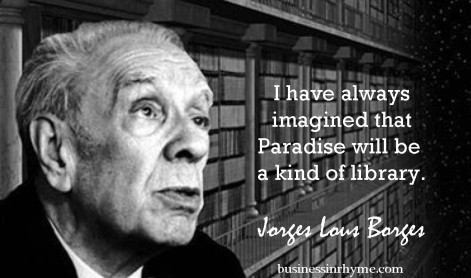Jorge Luis Borges was a famous writer, essayist, and poet from Argentina. His first poem, ‘Hymn to the Sea,’ was published in the magazine Grecia. Today, he is recognized as one of the most influential figures in Argentinian literature. With wild imagination and innovative literary skills, he left his mark in the world literature as well – especially after receiving the first International Publishers’ Prize, the Prix Formentor in 1961. As fluent in many different languages, he was greatly influenced by European culture. What’s noticeable in his work is how he was preoccupied with the theme of time: the fictional world he was creating was very much inspired by esoteric readings in literature, philosophy, and theology. In the universe of energy, mass, and speed of light, for him, the central question is time, not space. (source)
He writes:
Time is the substance I am made of. Time is a river which sweeps me along, but I am the river; it is a tiger which destroys me, but I am the tiger; it is a fire which consumes me, but I am the fire.
The impermanence of time and things was always a food for thought for him and a greatest value he saw in it, is an opportunity for learning, maturing and really living life:
After a while you learn the subtle difference
Between holding a hand and chaining a soul,And you learn that love doesn’t mean leaning
And company doesn’t mean security.And you begin to learn that kisses aren’t contracts
And presents aren’t promises,And you begin to accept your defeats
With your head up and your eyes open
With the grace of a woman, not the grief of a child,And you learn to build all your roads on today
Because tomorrow’s ground is too uncertain for plans
And futures have a way of falling down in mid-flight.After a while you learn…
That even sunshine burns if you get too much.So you plant your garden and decorate your own soul,
Instead of waiting for someone to bring you flowers.And you learn that you really can endure…
That you really are strong
And you really do have worth…
And you learn and learn…
With every good-bye you learn.
He openly showed his love for reading and books.
Personally, I am a hedonistic reader; I have never read a book merely because it was ancient. I read books for the aesthetic emotions they offer me, and I ignore the commentaries and criticism.
Let others pride themselves about how many pages they have written; I’d rather boast about the ones I’ve read.
For every aspiring writer, is a prerequisite to be an avid reader – as from there, every emotion “read” and lived is a fertile soil for every future work. With each reading, book gains new meaning and offers completely new reality:
A book is more than a verbal structure or series of verbal structures; it is the dialogue it establishes with its reader and the intonation it imposes upon his voice and the changing and durable images it leaves in his memory. A book is not an isolated being: it is a relationship, an axis of innumerable relationships.
I think that the reader should enrich what he is reading. He should misunderstand the text; he should change it into something else.
For further diving into the topic of reading and its importance in our lives I recommend:
Are you a ‘deep reader’? 3 reasons why you should nurture this habit
Lean leader is a poetry reader.
How often do you read and what’s your favorite book? Please, share in the comments below.
If you liked this post and you are interested in getting more inspiration for your creativity, sign up for our free bimonthly newsletter.



Just excellent.
LikeLiked by 1 person
I’m glad you liked the article 🙂
LikeLiked by 1 person
Beautiful post. Reposting!
Mo
LikeLiked by 1 person
Thanks Mo 🙂
LikeLike
Your best post……..and I have read many, and found them good.
LikeLiked by 1 person
Thanks, I’m glad you like my articles and that they are helpful 🙂
LikeLiked by 1 person
A wonderful thought. We can sit in an open air library and eat tiny edible book topped cupcakes while reading in the sun. ‘Ahhhhh’ sublime.
LikeLiked by 1 person
Love the way you think too 😉
LikeLiked by 1 person
You mean a bit loopy? Don’t answer I know, I just have a mind that encourages me. 😇
LikeLiked by 1 person
🙂 books have been a great part of mine life too, so I completely understand you!
LikeLiked by 1 person
My husband will be impressed… someone understanding my strategically curved mind. Ha! Ha!
LikeLiked by 1 person
🙂
LikeLiked by 1 person
I liked this – and a wonderful poem. At the moment I am reading “American Notes” by Charles Dickens: an angry, funny, phantasmagoric account of his journey through America in 1842.
LikeLiked by 1 person
Thank you 🙂
LikeLike